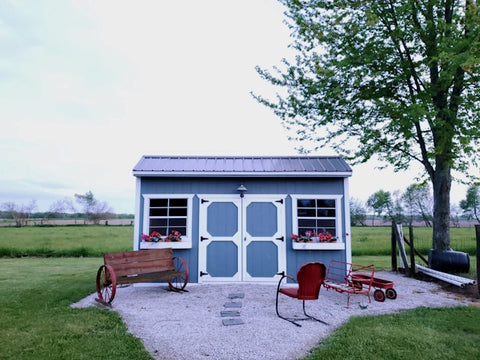- Home
- Shop
- Living
- Blog
- MIKOLITE
- SinterTech
- About
- Gallery
- Sign in
-
United States (USD $)
March 02, 2024

Tiny homes are becoming increasingly popular and for good reason. These compact living spaces offer a simpler, more sustainable lifestyle that allows individuals to declutter their homes and focus on what truly matters. Minimalism is a key aspect of tiny home living, promoting the idea of owning only what you need and eliminating excess possessions. Embracing minimalism in your tiny home can bring numerous benefits, from saving money on living expenses to reducing your carbon footprint.
In this blog post, we will explore the reasons why you should consider embracing minimalism in tiny homes and how it can positively impact your life. Let's get started.
One of the major reasons to embrace minimalism in tiny homes is its cost-effectiveness. With a smaller living space, there is less need for expensive furniture, decor, and household items. Tiny homes also require less energy to heat and cool, resulting in lower utility bills.
Additionally, by owning fewer possessions, you can save money on storage costs and avoid impulse purchases. Minimalist living also encourages intentional spending, where you only purchase items that truly add value to your life. This can lead to significant savings in the long run and allow you to allocate funds towards experiences or investments rather than material possessions.
Another advantage of embracing minimalism in tiny homes is the mobility it offers. You can find tiny homes on wheels, allowing you to easily move your home to different locations without the hassle of packing and unpacking. This flexibility can be beneficial for those who enjoy traveling or want the freedom to relocate without being tied down by a traditional house.
Additionally, tiny homes take up less space on the road, making it easier to navigate through narrow roads and reduce travel costs. With minimal possessions, moving homes becomes a simpler and more cost-effective process. Overall, minimalism in tiny homes provides the opportunity for a more mobile lifestyle.
Minimalist living promotes sustainability, which is another compelling reason to embrace it in tiny homes. With less space and fewer possessions, there is less waste produced, leading to a smaller environmental footprint. Many tiny homes also incorporate eco-friendly features, such as solar panels and composting toilets, reducing reliance on traditional energy sources and minimizing the impact on the environment.
Moreover, living a simpler lifestyle in a tiny home encourages individuals to consume less and be more mindful of their environmental impact. For instance, instead of buying new items, a minimalist may choose to repurpose or borrow from others, reducing the demand for new products and ultimately decreasing their carbon footprint. By choosing to live with less, you are making a positive contribution towards creating a more sustainable world.
One of the fundamental principles of minimalism is decluttering, and tiny homes offer the perfect opportunity to do so. With limited space, individuals are forced to evaluate their possessions and keep only what they truly need and value. This can lead to a sense of freedom from material possessions and reduce the stress and burden of maintaining a large home.
Furthermore, decluttering can have a positive impact on mental health, promoting a sense of calm and clarity. A good example is the popular KonMari method, which encourages individuals to only keep items that spark joy in their lives. In a tiny home, every item has a purpose and place, making it easier to maintain a clutter-free living space.
Minimalism in tiny homes also encourages individuals to focus on experiences over possessions. With less space for material items, there is more room and opportunity to create meaningful experiences and memories. This can include spending time outdoors, traveling, or pursuing hobbies and passions.
Moreover, by limiting the number of possessions we own, we are forced to be more intentional with our purchases and only choose items that align with our values and bring true joy. As a result, individuals can find more fulfillment in their experiences rather than constantly chasing material possessions.
Living in a tiny home means less cleaning and maintenance compared to traditional homes. With fewer rooms and possessions, there is less surface area to clean and organize. This can save valuable time and energy, allowing individuals to focus on other aspects of their lives.
Additionally, with a smaller living space, there is less need for constant repairs or renovations, resulting in lower maintenance costs. This can also lead to a more sustainable lifestyle by reducing the use of resources and materials. Overall, minimalism in tiny homes promotes a simpler and more manageable living space.
Embracing minimalism in tiny homes can have a positive impact on the environment. By living with less, individuals are reducing their carbon footprint and minimizing waste production. This is beneficial for the planet and can contribute towards creating a more sustainable future.
Moreover, many tiny homes incorporate eco-friendly features such as rainwater harvesting systems and solar panels, further reducing their environmental impact. By choosing to live in a tiny home, individuals are making a conscious effort to live more sustainably and help preserve the planet for future generations.

Lastly, minimalism in tiny homes promotes mindfulness by encouraging individuals to be intentional with their possessions and lifestyle choices. With limited space, individuals are forced to evaluate their priorities and only keep what truly serves a purpose in their lives. This can lead to a more mindful and intentional way of living, where individuals focus on quality over quantity.
Moreover, living in a tiny home requires individuals to be present and appreciate the simple joys in life, rather than constantly chasing material possessions. By embracing minimalism in tiny homes, individuals can find more fulfillment and purpose in their daily lives.
There are numerous reasons to embrace minimalism in tiny homes, ranging from cost-effectiveness and sustainability to promoting mindfulness and decluttering. Whether you are looking for a simpler lifestyle or want to make a positive impact on the planet, minimalism in tiny homes offers many benefits that are worth considering. So, if you are ready to declutter your life and embrace a more intentional way of living, consider making the switch to a tiny home. The possibilities and benefits are endless.
Comments will be approved before showing up.
